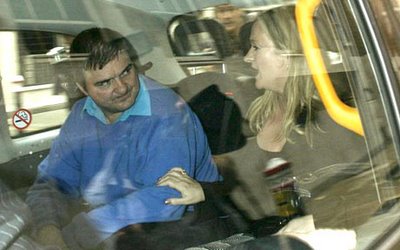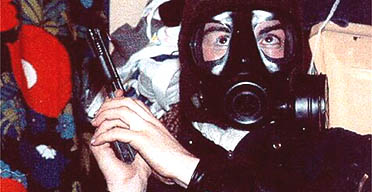Barry George and the News International smear merchants.
A classic of the genre is making someone comfortable, thinking they're going to be given a soft soap, friendly interview and a sympathetic piece, as you might expect having it just been confirmed that you were the victim of one of the most notorious miscarriages of justice of recent times, and then either going on the attack or, as in this case, making the quotes up. The News of the Screws, which bought George's story, today admitted that George had not told the paper that "he couldn't have murdered Jill Dando, as he was stalking someone else at the time". Unlike most made-up quotes in the tabloids, which you can spot a mile off, this was an actually believable one, especially when the tabloids had painted a picture of George as a notorious oddball that spent all his spare time following and frightening women. Along with the Screws interview, George also went under the forensic gaze of the ever fragrant Kay Burley on Sky News, which was probably the biggest mistake of the lot. Burley it seems decided that George, on the basis of possibly asking for her phone number and contact details after the interview (it's unclear how much of what was reported at the time was true, now that so much has been retracted) and cycling to the Sky News studios to ask for a copy of it was either stalking her or about to start, her fears of which, as well as being reported to the police, were also published in all the nation's leading titles. Whether they began in the Murdoch titles originally or not is now difficult to ascertain, but it wouldn't exactly be surprising.
Those attempts at casting aspersions on his innocence were however nothing compared to the treatment he got in the Sun the day after he was acquitted. Mike Sullivan, the paper's crime editor (featured previously here on a number of occasions) drew up a list of 10 "facts" which the jury didn't hear, a run-down which had quite obviously been provided by the police and which was in any case just as the flimsy as the case which was presented against him, as I detailed on the day. Also published that day, and still available on the Sun's website, was a "warning" from the woman George raped in 1982, of which these three paragraphs stand out:
"I was angry that despite what happened to me, Barry George had been left alone. No one had seen the signs or done anything about it."I have seen George portrayed as some kind of harmless eccentric. But he is far from benign.
"He knows how to work the system and look like a sad case. I think he always craved notoriety."
He knows how to work the system, a rather dubious claim about someone with a personality disorder and an IQ of 75, who in the words of Paddy Hill you wouldn't trust to go to Tesco - but not one that the Sun felt like tempering. Over a month later and the paper was still at it, making an issue of George sharing a hotel with mainly women, along with quotes which look highly suspect. Around the only piece that was even sympathetic towards George was a comment from the Scottish Sun columnist Martel Maxwell, and even that emphasised that George could still be a "nasty piece of work".
Whether George will be having the last laugh, having received between £50,000 and £100,000 from the Screws and Sky for the original interviews, and with now a likely further £100,000 for what was to all intents and purposes a smear campaign is unclear. It is however beyond low, and shows that the media has learned absolutely nothing from the way it went after Colin Stagg in similar circumstances, motivated then as now by the exact same police force which had brought the ridiculously dubious prosecution in the first place. George, you get the feeling, will also not be the last to be subject to similar treatment.
Labels: abuses by tabloids, Barry George, libel, miscarriages of justice, News International, News of the World, Scum-watch, Sun-watch



